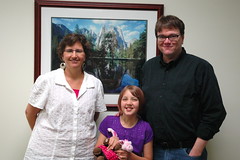
I'm bracing myself for the Conservative backlash against the commemorations already beginning in honor of Senator Edward Kennedy, who passed away last night. Those of you who feel like doing a little dance on the man's grave would be well advised to do it far away from me or my family, or any of the tens of thousands of families just like ours. Or, if you really look at it, probably families just like yours, too. I challenge any of you to show me a politician of either party within the last century whose legislative actions have done so much to help Americans, in ways that have a direct impact on their lives.
Here's a very short, woefully incomplete list of why I'm not particularly interested in hearing why you didn't care for Ted Kennedy. I'll bet you can find at least two pieces of legislation on this list, laws molded in part or entirely by Senator Kennedy, that have literally saved my daughter's future. Hers, and countless more just like her, both living and not yet even born.
1964: Head Start
-- Provided meals and early education to pre-school children through the Employee Opportunity Act. (Schuyler participated in a Head Start program when she was a baby. It was part of the early intervention program that probably saved her.)
1971: Federal Cancer Research Program
-- Quadrupled the amount of money spent by the federal government to fight cancer.
1972: Title IX
-- Demanded equal funding for men's and women's athletics on college campuses.
1975: Individuals with Disabilities Education Act (IDEA)
-- Guaranteed free and appropriate public education to children with disabilities. (This is the law that provides for Schuyler's education, and for EVERY SINGLE CHILD WITH A DISABILITY in public schools in this country. Every single one of them. Think about that for just a moment.)
1978: Civil Rights Commission Act Amendments
-- Expanded the jurisdiction of the Civil Rights Commission to protect people from discrimination on the basis of disability.
1984: Improved Access to Polling Stations
-- Required polling stations to provide physical accessibility for physically disabled and elderly people on federal election days.
1986: Employment Opportunities for Disabled Americans Act
-- Allowed disabled workers to receive SSI benefits and Medicaid coverage.
1988: Fair Housing Act Amendments
-- Prohibited discrimination towards people with disabilities in the sale or rental of housing.
1989: National Military Child Care Act
-- Established the Department of Defense child care system.
1990: Americans with Disabilities Act
-- Prohibited discrimination against any qualified individual with a disability in job application procedures, hiring or discharge, compensation, advancement and training. (This is another big one for Schuyler and her friends. There are people in this country whose lives, and the quality of those lives, have been saved by this law. That's not even remotely an exaggeration.)
1990: Ryan White CARE Act
-- Provided assistance to states to develop effective and cost-efficient AIDS care programs, aimed particularly at early diagnosis and home care.
1993: National and Community Service Trust Act
-- Created AmeriCorps and the Corporation for National and Community Service to help expand volunteerism and education grants for students who choose to volunteer for service after college.
1993: Student Loans
-- Allowed students to borrow money for college directly from the federal government.
1994: Family and Medical Leave Act
-- Provided up to 12 weeks of unpaid leave for family emergencies or after the birth of infants.
1994: Crime Act
-- Secured funding for 100,000 new police officers, imposed new penalties for crimes involving gangs and firearms and authorized the Police Corps, a program to award college scholarships to students in return for a commitment to serve as police officers.
1996: Kennedy-Kassebaum Act
-- Enabled employees to keep health insurance after leaving their job and prohibited insurance companies from refusing to renew coverage on the basis of preexisting medical conditions.
1996: Mental Health Parity Bill
-- Eliminated limits on mental health coverage that differ from other covered illnesses.
1997: State Children's Health Insurance Program (SCHIP)
-- Supported state efforts to provide health insurance to uninsured children in low-income families.
2000: Minority Health and Health Disparities Research and Education Act
-- Improved data systems and research on the extent and severity of minority health problems, and authorized significant resources to help enhance the delivery of health care to minorities.
2001: No Child Left Behind Act
-- Required more rigorous testing of public school students and permitted parents to transfer their children from low-performing to higher-performing schools. (Clearly I've had issues with the implementation of this law, but the philosophy behind it is sound, and even in its flawed state, it has helped a lot of kids with disabilities.)
2006: Family Opportunity Act
-- Provided states the opportunity to expand Medicaid coverage to children with special needs and allowed low- and middle-income families with disabled children the ability to purchase coverage under the Medicaid program.
-----
Senator Kennedy, on behalf of those who are unable to say it for themselves, thank you for your service to this country.
Senator Kennedy, on behalf of those who are unable to say it for themselves, thank you for your service to this country.

























